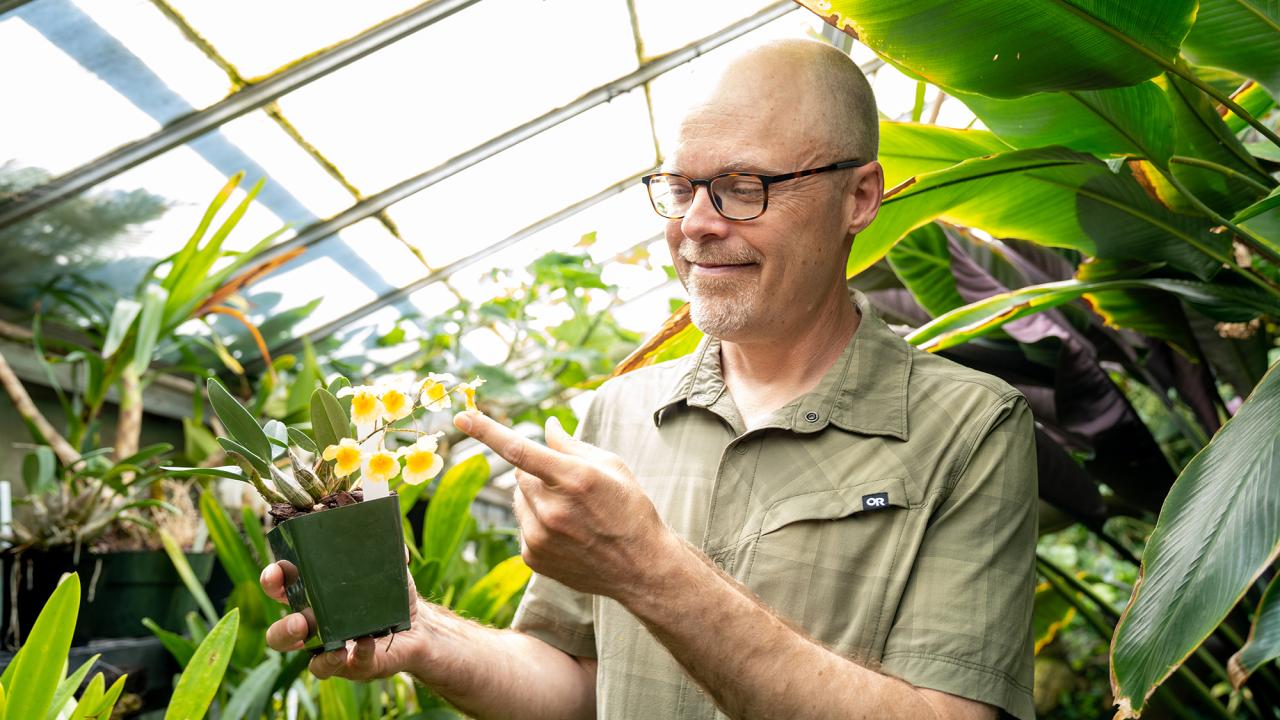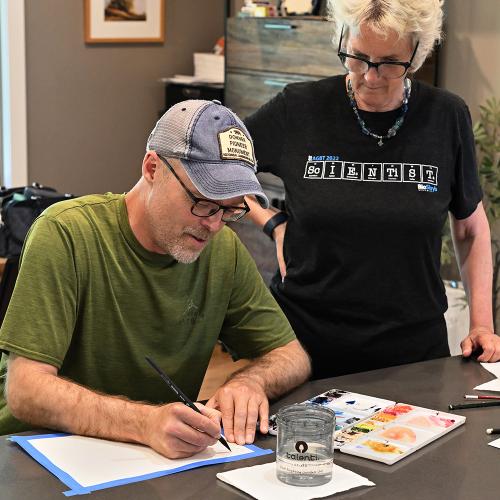
Joel Ledford Receives 2024 ASUCD Excellence in Teaching Award
Students recognize Ledford for positivity, ingenuity and compassion
Joel Ledford, an associate professor of teaching in the Department of Plant Biology, has received the 2024 Excellence in Teaching Award from the Associated Students, University of California, Davis (ASUCD). The annual award celebrates teaching faculty for their dedication to students and undergraduate education.
“Getting an award like this from students means a lot to me,” Ledford said. “It’s an inspiring thing, and it makes you want to be a better teacher.”
In nominating Ledford, one student said that “his commitment to teaching is one of the greatest I've seen here at UC Davis so far. He brings a positive energy and engages everyone.” Another student noted that Ledford is “very organized, understanding, and clear in explaining difficult concepts, and he knows what students should focus on and what to ignore.”
"Joel is an outstanding colleague, a dedicated instructor and cares deeply about the success of his students,” said Savithramma Dinesh-Kumar, a professor and chair in the Department of Plant Biology. “I am delighted that he is receiving the 2024 ASUCD Excellence in Education Award. It is a well-deserved recognition of a deeply committed teacher and mentor."
A “meandering” path to teaching
Ledford joined UC Davis in 2016 as a professor of teaching. He teaches an introductory biology course, BIS 2C “Introduction to Biology: Biodiversity and the Tree of Life,” which accommodates upwards of 800 undergraduates. In the classroom, Ledford resists the idea of professors as “sage on the stage” and spends more time walking around and engaging directly with students than at the lectern.
“I’m very mindful that I am one of the first professors that students will have a chance to interact with, and first impressions really matter,” Ledford said. “Success in introductory classes is important for persistence, especially for first-generation college students.”
Ledford received his own Bachelor of Science in Entomology from UC Davis in 1998, after which he completed a master’s in evolution and ecology at San Francisco State University. He then worked as a middle school science teacher for five years before earning a Ph.D. at the University of California, Berkeley, where he studied Leptonetidae, a small and obscure group of spiders that he continues to research.
“It was sort of a meandering pathway, but teaching was always a really important part of the things that I was doing,” he said.
A personal connection to the undergrad experience
Effective teaching hinges upon the teacher-student connection, which is why Ledford likes to incorporate active approaches to learning.
“I don't see a big difference between teaching at different levels,” Ledford said. “I think people fundamentally learn the same way, so I use the same principles and approaches when I’m teaching watercolor painting as I do in the middle school classroom, and in a college-level science course.”

Ledford says he struggled as an undergraduate, which is one reason he feels drawn towards helping struggling students navigate their time at UC Davis.
“I really get a lot of joy out of helping students who are struggling at Davis—who are, I guess, like me,” he said. “I didn't do well as an undergrad here at UC Davis, and a career in academia is not something I was thinking about at all.”
He’s also passionate about actively improving equity in education.
“Researching and talking about equity issues is good, but at some point, it comes down to, what are you actually going to do?” he said. “I'm happiest in the trenches doing the work.”
But finding students who are struggling isn’t always easy, especially in a class of over 800 students. To this end, Ledford and Susan Keen, a professor of teaching in the Department of Evolution and Ecology, have made a concerted effort to help first-generation college students.
“First-gen students face a lot of struggles that people that have had family history of going to college don't,” he said.
Together, Ledford and Keen introduced optional companion classes, or “co-classes,” that are open to first-generation college students and run alongside introductory biology courses. These co-classes complement the main course by teaching skills that help students manage and persist in college—for example, the science of learning, test-taking techniques, and how to manage anxiety and imposter syndrome. Today, first-generation students who enroll in the co-class are likelier to pass the main course.
As teaching practices evolve, stay student-focused
Ledford sees a lot more innovation in teaching at Davis since his time here as an undergrad, but he encourages faculty—teaching and non-teaching alike—to continue experimenting in the classroom, and to endeavor to form connections with their students. For students, he says, the most important thing is just showing up.
“It's important that we all stay student focused—that's why we're here,” Ledford said. “We need to continue to strive towards meeting students where they're at in their learning as opposed to where we think they should be.”
Media Resources
- Liana Wait is a freelance science writer based in Philadelphia. She has a Ph.D. in ecology and evolutionary biology and specializes in writing about the life sciences.
